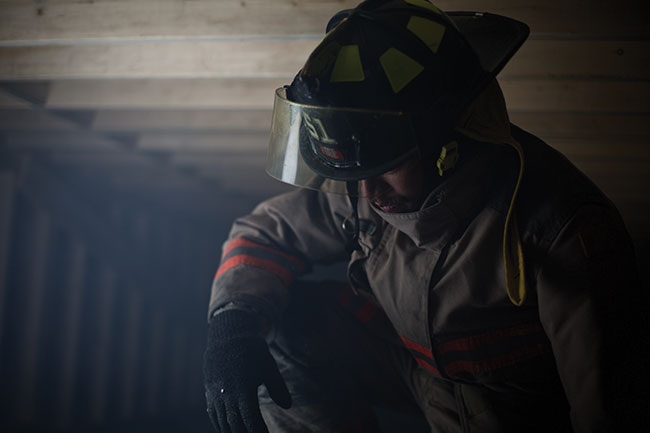
Features
Building resilient minds
Developing psychological strength in firefighters across Canada
February 27, 2023
By Joel Johnson
 Traumatic experiences cannot be removed from the first responder role, but having strategies in their toolkit means the impact will lessen.
PHOTO: © Bigbambi.ca / Adobe Stock
Traumatic experiences cannot be removed from the first responder role, but having strategies in their toolkit means the impact will lessen.
PHOTO: © Bigbambi.ca / Adobe Stock Firefighters are subject to some of the greatest psychosocial risks of any profession. Many will experience some level of trauma throughout their careers, but all it takes is one call to dramatically shift the tide between the ability to cope and the descent into anxiety, despair, and depression. It is often those experiences that involve a child, a threat to one’s own life or completed suicides that is the unexpected breaking point. This is what 27-year veteran firefighter, Dave Gillespie of Peterborough, Ont., discovered after a particularly traumatic call.
Gillespie recalls a failed rescue attempt of a child. After the event, Dave would replay the scene in his mind for days on end and when he could no longer sleep at night, Dave used wine as his coping strategy. After months of struggling, it was his peers who Dave reached out to for help.
Today, Dave’s health is back on track. With the support and encouragement of his peers, Dave eventually sought out professional help but notes he wishes he had reached out earlier. This is one of the reasons he became a peer instructor for the Resilient Minds program – to promote the importance of early intervention.
Resilient Minds is a peer-to-peer taught program co-designed by Canadian Mental Health Association Vancouver-Fraser Branch (CMHA) and firefighters in response to the concerning experiences and stress-related injuries observed within fire services.
“I want to ensure that other firefighters and first responders develop the psychological strength to weather the ups and downs of the career,” said Gillespie. “Firefighters like me need to have the resources available to them, rather than looking to substance use or even suicide.”
Greater risk of psychological injury
According to the Centre for Suicide Prevention, first responders—firefighters, paramedics, police—are considered to be at greater risk for acute stress disorder (ASD) and post-traumatic stress disorder (PTSD) than most other occupations. This is because their everyday duties routinely encounter “traumatic stressors” (Haugen, 2012, p.370).
A study conducted in 2017 by the Ruderman Family Foundation found that PTSD and depression can be almost five times higher among firefighters and police officers than the general public, and that more firefighters died by suicide than in the line of duty.
At the time the Resilient Minds program was developed, 78 per cent of first responders had not received basic resiliency training making this program a priority to get into the hands (and minds) of firefighters.
“Firefighters are in desperate need of skills to safeguard their psychological health that aren’t taught as part of their technical training,” says Leanne MacLeod, National Manager of Resilient Minds. “This skill deficit contributes to a high rate of suicide among firefighters; 30 per cent higher than the general population.”
Building psychological strength
Resilient Minds engages and informs firefighters in four crucial areas relevant to their work: trauma, psychological distress, trauma-informed responses and exploring resilience, personal well-being, reconnection and post-traumatic growth.
“CMHA is dedicated to building resilient fire teams and services,” says MacLeod. “We aim to educate, empower and equip firefighters with the necessary skills and resources to grow and maintain psychological wellness.”
Not only that, but MacLeod and the CMHA believe in inspiring firefighters to recognize and respond to psychological injuries and trauma in the workplace, and importantly, promote a shift to a supportive and mentally fit culture.
The program has supported thousands of firefighters across Canada, including for wildland firefighters. Today, through funding by the Public Health Agency of Canada, Resilient Minds has been adapted for Indigenous fire services and translated for Francophone firefighters which is set to launch in spring of 2023.
Traumatic experiences cannot be removed from the first responder role, but having the knowledge, education, coping strategies and resiliency in their toolkit means the challenges many will face, along with their families and loved ones, will lessen. This is what MacLeod, Gillepsie and other peer instructors hear from those who have taken the course. By developing a resilience plan now, participants find it is easier to work through traumatic experiences when they face them, and help their colleagues when they see them struggle.
“As a mental health trainer in the fire service for the last 20 years, Resilient Minds is the first program I’ve seen that addresses proactive resilience and care for my peers,” states Gillespie. “Not only that, but it also helps with what to say to citizens during a difficult call, and provides us with specific tools for self-care.”
Joel Johnson is a veteran first responder from Toronto. His research examines the impact of vicarious trauma through imagery in media. Joel now provides his knowledge and expertise to advocate for the psychological health of first responders.
Print this page
Advertisement
- Trainer’s Corner: Live fire kit workshop
- New study assesses effectiveness of decon to reduce exposure to PAHs